Zhi-Hua Zhou
Dynamic Regret via Discounted-to-Dynamic Reduction with Applications to Curved Losses and Adam Optimizer
Feb 09, 2026Abstract:We study dynamic regret minimization in non-stationary online learning, with a primary focus on follow-the-regularized-leader (FTRL) methods. FTRL is important for curved losses and for understanding adaptive optimizers such as Adam, yet existing dynamic regret analyses are less explored for FTRL. To address this, we build on the discounted-to-dynamic reduction and present a modular way to obtain dynamic regret bounds of FTRL-related problems. Specifically, we focus on two representative curved losses: linear regression and logistic regression. Our method not only simplifies existing proofs for the optimal dynamic regret of online linear regression, but also yields new dynamic regret guarantees for online logistic regression. Beyond online convex optimization, we apply the reduction to analyze the Adam optimizers, obtaining optimal convergence rates in stochastic, non-convex, and non-smooth settings. The reduction also enables a more detailed treatment of Adam with two discount parameters $(β_1,β_2)$, leading to new results for both clipped and clip-free variants of Adam optimizers.
ZipMoE: Efficient On-Device MoE Serving via Lossless Compression and Cache-Affinity Scheduling
Jan 29, 2026Abstract:While Mixture-of-Experts (MoE) architectures substantially bolster the expressive power of large-language models, their prohibitive memory footprint severely impedes the practical deployment on resource-constrained edge devices, especially when model behavior must be preserved without relying on lossy quantization. In this paper, we present ZipMoE, an efficient and semantically lossless on-device MoE serving system. ZipMoE exploits the synergy between the hardware properties of edge devices and the statistical redundancy inherent to MoE parameters via a caching-scheduling co-design with provable performance guarantee. Fundamentally, our design shifts the paradigm of on-device MoE inference from an I/O-bound bottleneck to a compute-centric workflow that enables efficient parallelization. We implement a prototype of ZipMoE and conduct extensive experiments on representative edge computing platforms using popular open-source MoE models and real-world workloads. Our evaluation reveals that ZipMoE achieves up to $72.77\%$ inference latency reduction and up to $6.76\times$ higher throughput than the state-of-the-art systems.
A Simple, Optimal and Efficient Algorithm for Online Exp-Concave Optimization
Dec 29, 2025Abstract:Online eXp-concave Optimization (OXO) is a fundamental problem in online learning. The standard algorithm, Online Newton Step (ONS), balances statistical optimality and computational practicality, guaranteeing an optimal regret of $O(d \log T)$, where $d$ is the dimension and $T$ is the time horizon. ONS faces a computational bottleneck due to the Mahalanobis projections at each round. This step costs $Ω(d^ω)$ arithmetic operations for bounded domains, even for the unit ball, where $ω\in (2,3]$ is the matrix-multiplication exponent. As a result, the total runtime can reach $\tilde{O}(d^ωT)$, particularly when iterates frequently oscillate near the domain boundary. For Stochastic eXp-concave Optimization (SXO), computational cost is also a challenge. Deploying ONS with online-to-batch conversion for SXO requires $T = \tilde{O}(d/ε)$ rounds to achieve an excess risk of $ε$, and thereby necessitates an $\tilde{O}(d^{ω+1}/ε)$ runtime. A COLT'13 open problem posed by Koren [2013] asks for an SXO algorithm with runtime less than $\tilde{O}(d^{ω+1}/ε)$. This paper proposes a simple variant of ONS, LightONS, which reduces the total runtime to $O(d^2 T + d^ω\sqrt{T \log T})$ while preserving the optimal $O(d \log T)$ regret. LightONS implies an SXO method with runtime $\tilde{O}(d^3/ε)$, thereby answering the open problem. Importantly, LightONS preserves the elegant structure of ONS by leveraging domain-conversion techniques from parameter-free online learning to introduce a hysteresis mechanism that delays expensive Mahalanobis projections until necessary. This design enables LightONS to serve as an efficient plug-in replacement of ONS in broader scenarios, even beyond regret minimization, including gradient-norm adaptive regret, parametric stochastic bandits, and memory-efficient online learning.
Re$^{\text{2}}$MaP: Macro Placement by Recursively Prototyping and Packing Tree-based Relocating
Nov 11, 2025Abstract:This work introduces the Re$^{\text{2}}$MaP method, which generates expert-quality macro placements through recursively prototyping and packing tree-based relocating. We first perform multi-level macro grouping and PPA-aware cell clustering to produce a unified connection matrix that captures both wirelength and dataflow among macros and clusters. Next, we use DREAMPlace to build a mixed-size placement prototype and obtain reference positions for each macro and cluster. Based on this prototype, we introduce ABPlace, an angle-based analytical method that optimizes macro positions on an ellipse to distribute macros uniformly near chip periphery, while optimizing wirelength and dataflow. A packing tree-based relocating procedure is then designed to jointly adjust the locations of macro groups and the macros within each group, by optimizing an expertise-inspired cost function that captures various design constraints through evolutionary search. Re$^{\text{2}}$MaP repeats the above process: Only a subset of macro groups are positioned in each iteration, and the remaining macros are deferred to the next iteration to improve the prototype's accuracy. Using a well-established backend flow with sufficient timing optimizations, Re$^{\text{2}}$MaP achieves up to 22.22% (average 10.26%) improvement in worst negative slack (WNS) and up to 97.91% (average 33.97%) improvement in total negative slack (TNS) compared to the state-of-the-art academic placer Hier-RTLMP. It also ranks higher on WNS, TNS, power, design rule check (DRC) violations, and runtime than the conference version ReMaP, across seven tested cases. Our code is available at https://github.com/lamda-bbo/Re2MaP.
Optimistic Online-to-Batch Conversions for Accelerated Convergence and Universality
Nov 10, 2025

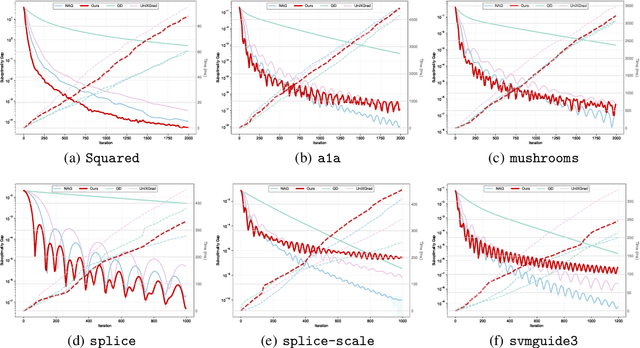
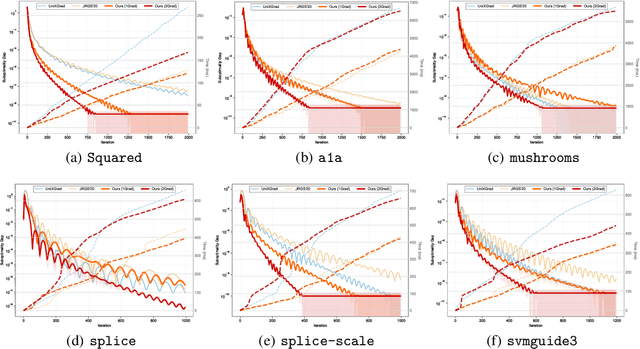
Abstract:In this work, we study offline convex optimization with smooth objectives, where the classical Nesterov's Accelerated Gradient (NAG) method achieves the optimal accelerated convergence. Extensive research has aimed to understand NAG from various perspectives, and a recent line of work approaches this from the viewpoint of online learning and online-to-batch conversion, emphasizing the role of optimistic online algorithms for acceleration. In this work, we contribute to this perspective by proposing novel optimistic online-to-batch conversions that incorporate optimism theoretically into the analysis, thereby significantly simplifying the online algorithm design while preserving the optimal convergence rates. Specifically, we demonstrate the effectiveness of our conversions through the following results: (i) when combined with simple online gradient descent, our optimistic conversion achieves the optimal accelerated convergence; (ii) our conversion also applies to strongly convex objectives, and by leveraging both optimistic online-to-batch conversion and optimistic online algorithms, we achieve the optimal accelerated convergence rate for strongly convex and smooth objectives, for the first time through the lens of online-to-batch conversion; (iii) our optimistic conversion can achieve universality to smoothness -- applicable to both smooth and non-smooth objectives without requiring knowledge of the smoothness coefficient -- and remains efficient as non-universal methods by using only one gradient query in each iteration. Finally, we highlight the effectiveness of our optimistic online-to-batch conversions by a precise correspondence with NAG.
TreeLoRA: Efficient Continual Learning via Layer-Wise LoRAs Guided by a Hierarchical Gradient-Similarity Tree
Jun 12, 2025Abstract:Many real-world applications collect data in a streaming environment, where learning tasks are encountered sequentially. This necessitates continual learning (CL) to update models online, enabling adaptation to new tasks while preserving past knowledge to prevent catastrophic forgetting. Nowadays, with the flourish of large pre-trained models (LPMs), efficiency has become increasingly critical for CL, due to their substantial computational demands and growing parameter sizes. In this paper, we introduce TreeLoRA (K-D Tree of Low-Rank Adapters), a novel approach that constructs layer-wise adapters by leveraging hierarchical gradient similarity to enable efficient CL, particularly for LPMs. To reduce the computational burden of task similarity estimation, we employ bandit techniques to develop an algorithm based on lower confidence bounds to efficiently explore the task structure. Furthermore, we use sparse gradient updates to facilitate parameter optimization, making the approach better suited for LPMs. Theoretical analysis is provided to justify the rationale behind our approach, and experiments on both vision transformers (ViTs) and large language models (LLMs) demonstrate the effectiveness and efficiency of our approach across various domains, including vision and natural language processing tasks.
Learnware of Language Models: Specialized Small Language Models Can Do Big
May 19, 2025Abstract:The learnware paradigm offers a novel approach to machine learning by enabling users to reuse a set of well-trained models for tasks beyond the models' original purposes. It eliminates the need to build models from scratch, instead relying on specifications (representations of a model's capabilities) to identify and leverage the most suitable models for new tasks. While learnware has proven effective in many scenarios, its application to language models has remained largely unexplored. At the same time, large language models (LLMs) have demonstrated remarkable universal question-answering abilities, yet they face challenges in specialized scenarios due to data scarcity, privacy concerns, and high computational costs, thus more and more specialized small language models (SLMs) are being trained for specific domains. To address these limitations systematically, the learnware paradigm provides a promising solution by enabling maximum utilization of specialized SLMs, and allowing users to identify and reuse them in a collaborative and privacy-preserving manner. This paper presents a preliminary attempt to apply the learnware paradigm to language models. We simulated a learnware system comprising approximately 100 learnwares of specialized SLMs with 8B parameters, fine-tuned across finance, healthcare, and mathematics domains. Each learnware contains an SLM and a specification, which enables users to identify the most relevant models without exposing their own data. Experimental results demonstrate promising performance: by selecting one suitable learnware for each task-specific inference, the system outperforms the base SLMs on all benchmarks. Compared to LLMs, the system outperforms Qwen1.5-110B, Qwen2.5-72B, and Llama3.1-70B-Instruct by at least 14% in finance domain tasks, and surpasses Flan-PaLM-540B (ranked 7th on the Open Medical LLM Leaderboard) in medical domain tasks.
Theoretical Investigation on Inductive Bias of Isolation Forest
May 19, 2025Abstract:Isolation Forest (iForest) stands out as a widely-used unsupervised anomaly detector valued for its exceptional runtime efficiency and performance on large-scale tasks. Despite its widespread adoption, a theoretical foundation explaining iForest's success remains unclear. This paper theoretically investigates the conditions and extent of iForest's effectiveness by analyzing its inductive bias through the formulation of depth functions and growth processes. Since directly analyzing the depth function proves intractable due to iForest's random splitting mechanism, we model the growth process of iForest as a random walk, enabling us to derive the expected depth function using transition probabilities. Our case studies reveal key inductive biases: iForest exhibits lower sensitivity to central anomalies while demonstrating greater parameter adaptability compared to $k$-Nearest Neighbor anomaly detectors. Our study provides theoretical understanding of the effectiveness of iForest and establishes a foundation for further theoretical exploration.
Curriculum Abductive Learning
May 18, 2025Abstract:Abductive Learning (ABL) integrates machine learning with logical reasoning in a loop: a learning model predicts symbolic concept labels from raw inputs, which are revised through abduction using domain knowledge and then fed back for retraining. However, due to the nondeterminism of abduction, the training process often suffers from instability, especially when the knowledge base is large and complex, resulting in a prohibitively large abduction space. While prior works focus on improving candidate selection within this space, they typically treat the knowledge base as a static black box. In this work, we propose Curriculum Abductive Learning (C-ABL), a method that explicitly leverages the internal structure of the knowledge base to address the ABL training challenges. C-ABL partitions the knowledge base into a sequence of sub-bases, progressively introduced during training. This reduces the abduction space throughout training and enables the model to incorporate logic in a stepwise, smooth way. Experiments across multiple tasks show that C-ABL outperforms previous ABL implementations, significantly improves training stability, convergence speed, and final accuracy, especially under complex knowledge setting.
Open3DBench: Open-Source Benchmark for 3D-IC Backend Implementation and PPA Evaluation
Mar 17, 2025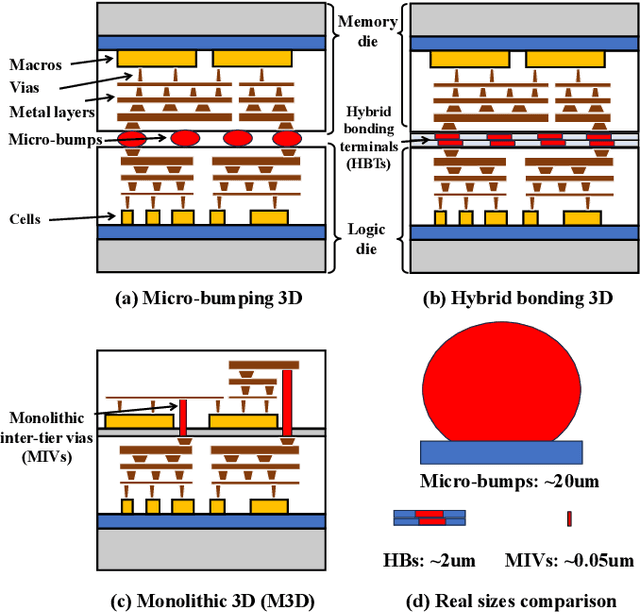
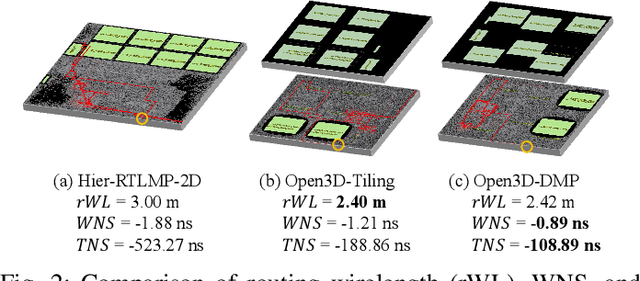
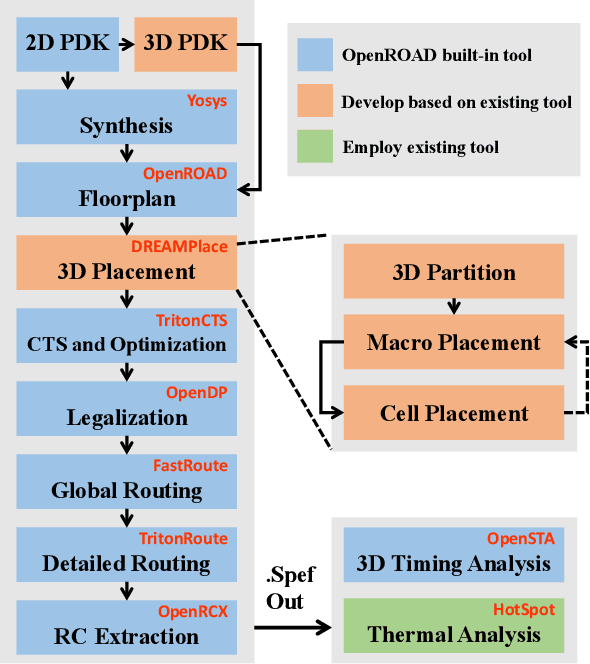

Abstract:This work introduces Open3DBench, an open-source 3D-IC backend implementation benchmark built upon the OpenROAD-flow-scripts framework, enabling comprehensive evaluation of power, performance, area, and thermal metrics. Our proposed flow supports modular integration of 3D partitioning, placement, 3D routing, RC extraction, and thermal simulation, aligning with advanced 3D flows that rely on commercial tools and in-house scripts. We present two foundational 3D placement algorithms: Open3D-Tiling, which emphasizes regular macro placement, and Open3D-DMP, which enhances wirelength optimization through cross-die co-placement with analytical placer DREAMPlace. Experimental results show significant improvements in area (51.19%), wirelength (24.06%), timing (30.84%), and power (5.72%) compared to 2D flows. The results also highlight that better wirelength does not necessarily lead to PPA gain, emphasizing the need of developing PPA-driven methods. Open3DBench offers a standardized, reproducible platform for evaluating 3D EDA methods, effectively bridging the gap between open-source tools and commercial solutions in 3D-IC design.
 Add to Chrome
Add to Chrome Add to Firefox
Add to Firefox Add to Edge
Add to Edge